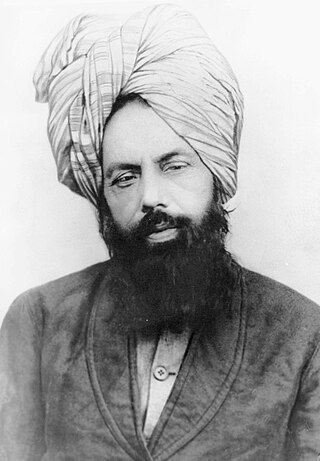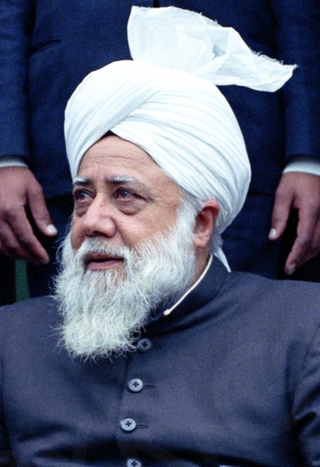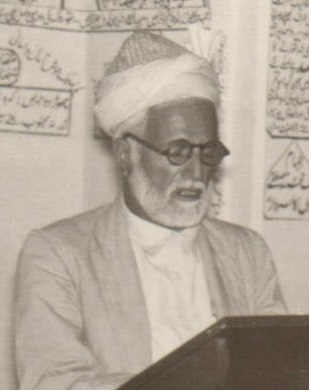Related Research Articles

Mirza Ghulam Ahmad was an Indian religious leader and the founder of the Ahmadiyya movement in Islam. He claimed to have been divinely appointed as the promised Messiah and Mahdī—which is the metaphorical second-coming of Jesus (mathīl-iʿIsā), in fulfillment of the Islamic prophecies regarding the end times, as well as the Mujaddid of the 14th Islamic century.

Sir Chaudhry Muhammad Zafarullah Khan was a Pakistani jurist and diplomat who served as the first Foreign Minister of Pakistan. After serving as foreign minister he continued his international career and is the only Pakistani to preside over the International Court of Justice. He also served as the President of the UN General Assembly. He is the only person to date to serve as the President of both UN General Assembly and the International Court of Justice.

Islam is the major religion in the Gambia, representing 97% of the 2 million population, with the first Muslim communities in the country arriving in 11th century. Islam has therefore had an influence on the Gambia throughout history, and continues to impact its culture, society and politics. The majority of The Gambia's Muslims are Sunni belonging to the Maliki school of jurisprudence, influenced with Sufism. There is a smaller Shiite community, largely stemming from Lebanese and Arab migration. The Ahmadiyya movement is also present. Other religious societies exist in the country, including Catholics, Protestants, Hindus and Traditional African religions.

Mirza Tahir Ahmad was the fourth caliph and the head of the worldwide Ahmadiyya Muslim Community. He was elected as the fourth successor of the founder of the community, Mirza Ghulam Ahmad. He was elected on 10 June 1982, the day after the death of his predecessor, Mirza Nasir Ahmad.

Mirza Nasir Ahmad was the third Caliph of the Ahmadiyya Muslim Community from Pakistan. He was elected as the third successor of Mirza Ghulam Ahmad on 8 November 1965, the day after the death of his predecessor and father, Mirza Basheer-ud-Din Mahmood Ahmad.

The Fazl Mosque also known as The London Mosque, is the first purpose-built mosque in London, England. It was opened on 23 October 1926 in Southfields, Wandsworth. At a cost of £6,223, the construction of the mosque and the purchase of the land on which it stands, was financed by the donations of Ahmadi Muslim women in Qadian, Punjab, British India, with support from the British Muslim convert Khalid Sheldrake. Between 1984 and 2019 the Fazl Mosque was the residence of the caliphs of the Ahmadiyya Muslim Community, and therefore its de facto international headquarters. The administrative headquarters now lies at the site of the Islamabad, Tilford.

Tuvalu House is the honorary consulate of the Government of Tuvalu in the Wimbledon area of London, England.

The Ahmadiyya branch of Islam has been subjected to various forms of religious persecution and discrimination since the movement's inception in 1889. The Ahmadiyya Muslim movement emerged within the Sunni tradition of Islam and its adherents believe in all of the five pillars and all of the articles of faith required of Muslims. Ahmadis are considered non-Muslims by many mainstream Muslims since they consider Mirza Ghulam Ahmad, the founder of the movement, to be the promised Mahdi and Messiah awaited by the Muslims.

Islam is a minority religion in the island nation Tuvalu. With the introduction of Ahmadiyya religion in 1985 by Ahmadi Muslims, there are approximately 50 Ahmadi Muslims in the country, of which all are members of the Ahmadiyya movement. Due to the country's small population of 10,679, this represents 0.46% of Tuvalu. The Tuvalu Mosque, in Funafuti, the capital of Tuvalu, is the only mosque in the country.

Ahmadiyya, officially the Ahmadiyya Muslim Jama'at (AMJ) is an Islamic messianic movement originating in British India in the late 19th century. It was founded by Mirza Ghulam Ahmad (1835–1908), who said he had been divinely appointed as both the Promised Mahdi and Messiah expected by Muslims to appear towards the end times and bring about, by peaceful means, the final triumph of Islam; as well as to embody, in this capacity, the expected eschatological figure of other major religious traditions. Adherents of the Ahmadiyya—a term adopted expressly in reference to Muhammad's alternative name Aḥmad—are known as Ahmadi Muslims or simply Ahmadis.

The Furqan Force or Furqan Battalion was a uniformed Battalion force of volunteers of the minority Ahmadiyya Muslim Community in the Dominion of Pakistan. Formed in June 1948 at the direction of Head of the Worldwide Ahmadiyya Muslim Community, Mirza Basheer-ud-Din Mahmood Ahmad, at the request of Pakistan government, the unit fought for Pakistan against India in the First Kashmir War. In addition to its troops being drawn from the Ahmadiyya population, the expenses of maintaining the unit were also paid by that community.

Ahmadiyya in Pakistan are members of the Ahmadiyya Community. The number of Ahmadiyya in the country has been variously estimated to between 0.22% and 2.2% of Pakistan's population. Hence, Pakistan is the home to the largest population of Ahmadis in the world. The city of Rabwah in the province of Punjab used to be the global headquarters of the Ahmadiyya Community before they were moved to England.

The Ahmadiyya Muslim Community was established in United Kingdom was established in July 1913 as one of the oldest Islamic associations in the UK. The community has built its presence with the establishment of significant sites such as The London Mosque in 1926. Over the decades the community has grown and become known for its annual convention the Jalsa Salana, interfaith dialogues and humanitarian efforts. The UK has also served as the headquarters of the community since 1984 currently in Islamabad, Tilford, in Surrey.
The word Mirzai is a religious slur used to refer to Ahmadis by many South Asian Muslims, primarily in Pakistan where they have been persecuted from early days and specially after the passage of Second Amendment to the Constitution of Pakistan which declares that Ahmadia are not Muslims and Ordinance XX. Ahmadis are the followers of Mirza Ghulam Ahmad of Qadian.
In the period spanning from late May to early September 1974, an altercation between students of Islami Jamiat-e-Talaba and youths of the Ahmadiyya Muslims Community at the Rabwah railway station. This incidents were marked by a series of events such as protests, violence, property damage, and governmental actions against the Ahmadiyya community across Pakistan. These events reportedly resulted in casualties among Ahmadi individuals and damage to Ahmadi mosques. Furthermore, in response to these events, the government took actions, including constitutional amendments, related to the status of Ahmadis.

Shams ud Din Khan (1900–1969) was a notable early Pashtun Ahmadi in the North West Frontier province of India. He remained its Provincial Ameer [Head] (1969). He was a close associate of Khalifatul Masih II and III.( Mirza Basheer-ud-Din Mahmood Ahmad and Mirza Nasir Ahmad) in his lifetime. He was a member of the Jama’at Khilafat Committee [Electoral College] and was one of the two proposers of the name of Mirza Nasir Ahmad at the time of his Election to the seat of Khilafat in November 1965. He remained a member of the Majlis Shura [Consultative Assembly] of the Ahmadiyya Muslim Community in Pakistan.

Ahmadiyya is an Islamic religious movement originating in 1889 in northern India around the teachings of Mirza Ghulam Ahmad (1835–1908), who claimed to have been divinely appointed as both the promised Mahdi and Messiah expected by Muslims to appear towards the end times.

Ahmadiyya in The Gambia is part of the worldwide Ahmadiyya Muslim Jama'at under the leadership of the Ahmadiyya Caliphate. Ahmadiyya teachings entered Gambia during the era of the Second Caliphate through the flow of Ahmadiyya literature and a number of traders returning to the country. The first missionary to enter the country was Alhaji Hamza Sanyaolo, a Nigerian who entered in 1959. After a number of months he was followed by Gibriel Saeed, a Ghanaian missionary. Since its earliest history in the Gambia, the community has been facing resistance and religious intolerance from certain Muslim clerics and Islamic bodies in the country.

The Tuvalu Order of Merit is an order of merit of Tuvalu. It was founded on 1 October 2016, on the 38th anniversary of Tuvaluan independence; with $30,000 for the award allocated in the Tuvalu 2017 National Budget.
References
- ↑ "Page B65 | Supplement 61262, 13 June 2015 | London Gazette | the Gazette".
- 1 2 3 "BRITAIN Plea to stop atolls sinking into Pacific". Herald on Sunday. Auckland, New Zealand. 17 June 2007. ProQuest 430430118 . Retrieved 21 April 2024– via ProQuest.
- 1 2 3 4 5 6 7 8 9 10 11 "Tanzanian Bestowed With Honours By Queen Elizabeth". AllAfrica.com. 24 April 2016. ProQuest 1783971991 . Retrieved 21 April 2024– via ProQuest.
- 1 2 3 4 "Dr. Iftikhar Ahmad AYAZ awarded Knighthood by Queen Elizabeth II". Rabwah Times. 14 June 2015. Retrieved 21 April 2024.
- 1 2 3 4 "About ICOP". International Commission Of Peace (ICOP). Archived from the original on 10 February 2009. Retrieved 21 April 2024.
- ↑ "Court Circular". The Daily Telegraph. 31 October 2017. ProQuest 1957751652 . Retrieved 21 April 2024– via ProQuest.
- ↑ "Citation His Excellency Sir Iftikhar Ahmad Ayaz, KBE". Lahore International Magazine. 1 June 2022. Retrieved 22 April 2024.
- ↑ "Sir Iftikhar Ayaz honoured by the Queen". MTA News. 22 May 2022. Retrieved 21 April 2024– via YouTube.
- ↑ Colchester, Max; Gross, Jenny (22 June 2016). "From Uganda but Live in Gibraltar? Come Vote in the 'Brexit' Referendum; U.K.-based citizens of more than 50 countries get a say on EU membership; 'Gimli's' fight". The Wall Street Journal (Online). ProQuest 1798798928 . Retrieved 21 April 2024– via ProQuest.
- ↑ "Tuvalu misses out on full benefits of its internet domain name, says envoy". PAC – Pacific Islands Broadcasting Association. 27 September 2007. Retrieved 27 April 2024– via Gale General OneFile.
- 1 2 Raza, Racheel (13 March 2013). "Human rights imperiled in Pakistan". The Toronto Sun . ProQuest 2230821828 . Retrieved 21 April 2024– via ProQuest.
- ↑ "Pakistani mullahs in league with terrorists, responsible for acts like Pulwama attack: Ahmadiyyas". Asian News International. 16 March 2019. ProQuest 2191793858 . Retrieved 27 April 2024– via ProQuest.
- ↑ "[Pakistan] minorities being persecuted by Islamic terrorists". Asian News International. New Delhi. 5 May 2018. ProQuest 2034653634 . Retrieved 21 April 2024– via ProQuest.